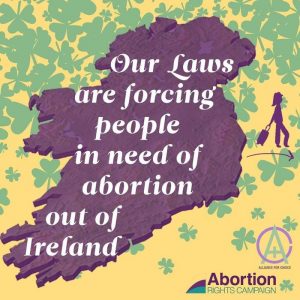
Dear Secretary of State:
We write to you from the Abortion Rights Campaign (ARC), a grassroots campaign representing pregnant people across the island of Ireland. We wish to express our concerns regarding the draft regulations on abortion provision in Northern Ireland. Last December we submitted a response to the Government’s consultation, welcoming the decision to uphold the recommendations made by the UN Committee on the Elimination of Discrimination Against Women (CEDAW). It is imperative that there is no retreat from this decision. Any departure from the CEDAW recommendations would be an absolute failure to uphold basic human rights principles and puts the health and lives of people in Northern Ireland at risk.
In our response, we highlighted the multitude of failings within the Irish system, and urged Northern Ireland not to go down this path – but instead to craft a regulatory framework built on evidence-based practice. We emphasised that imposing a gestational limit on early abortions would place a great burden on vulnerable people seeking abortions, including: disabled people, survivors of sexual assault, people in coercive or abusive relationships, those with caring responsibilities, or people living in rural areas. We also noted that in the Irish Republic, which imposes gestational limits, people are still forced to travel in order to access the healthcare they should be receiving at home.
It is equally important that the new regulatory framework not include unnecessary administrative hurdles, such as requiring approval from two doctors before an abortion can be provided. These hurdles provide no medical benefit and do not reflect clinical best practice. Instead, they create unnecessary barriers for both patients and providers. These barriers are even more dangerous in the context of countries which have introduced arbitrary and rigid gestational limits and exceptions-based clauses.
The move to decriminalise abortion in Northern Ireland, in line with international best practice, is fundamental to ensure that both patients and providers feel secure to seek and provide abortion healthcare. In the South, we have witnessed first-hand the damaging chilling effect of criminalising providers. We have seen doctors and hospitals interpreting the law in an overly cautious manner because they fear criminal sanctions. This chilling effect is a detriment to patients, especially combined with a strict 12-week cut-off for abortion on request. As the medical director of the Irish Family Planning Association explains, “When we get someone who thought they were eight, nine weeks, and turns out to be 11-plus, it becomes a panic to try and get them an appointment on time. It really does; there is no other way I can describe that.”1 Criminalisation effectively narrows the window in which patients can access abortion healthcare. The CEDAW Committee opposes criminalisation.2
In the Republic, we were promised safe access (or ‘buffer’) zones which have yet to materialise – to the detriment of patient and provider safety. There have been countless instances of harassment and intimidation outside clinics, which became readily apparent even in the first weeks and months of legal abortion provision. There is no reason to think things would be any different in the North. Indeed, there is ample evidence from the years when Marie Stopes had a clinic in Belfast of the aggressive tactics used to intimidate and harass patients trying to enter the clinic, as well as the clinic escorts. The UK Supreme Court has upheld the need for safe access zones around an Ealing clinic, indicating a legislative path for the protection of patients and staff. The regulations must create and enforce buffer zones immediately to prevent a recurrence of such tactics, as per CEDAW Committee recommendations3.
It is tempting to compare abortion legislation for Northern Ireland to England, rather than Ireland, as Northern Ireland is under the legislative umbrella of the United Kingdom. England’s abortion law, however, is over 50 years old – in those decades, there have been extensive changes in best practice for reproductive health. As Ireland has recently enacted abortion legislation for the first time, we serve as a much more current example of potential failings and barriers to care. We would urge you to take this opportunity to craft exemplary, evidence-based legislation that can serve as a model for other jurisdictions as well as upholding the rights of the people of Northern Ireland.
Yours etc.
Anna Carnegie and Cathie Shiels
Co-Conveners
Abortion Rights Campaign
1 C. Reilly, “Introducing abortion: The story so far,” Medical Independent (March 25, 2019).
2 United Nations CEDAW Report Inquiry concerning the United Kingdom of Great Britain and Northern Ireland under article 8 of the Optional Protocol to the Convention on the Elimination of All Forms of Discrimination against Women, see esp. par.72 (b).
3 United Nations CEDAW Report Inquiry concerning the United Kingdom of Great Britain and Northern Ireland under article 8 of the Optional Protocol to the Convention on the Elimination of All Forms of Discrimination against Women, par. 86 (g) “Protect women from harassment by anti-abortion protestors by investigating complaints, prosecuting and punishing perpetrators.”

